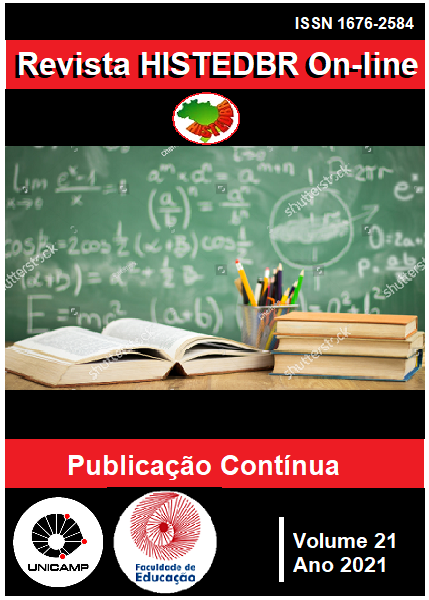Abstract
This article aimed to analyze the central elements of the emergence of Home Economics in the mid-19th century. The main objective was to learn, from Catherine Beecher's work “A Tratise on Domestic Economy”, which are the main characteristics of the proposal that appeared around 1840 and would later become an educational project for women spread around the world, including Brazil. It was possible to verify that, according to its historical contingencies, the Home Economics emerged anchored in the reproduction of traditions, in the sexual division of labor and in the technical and scientific advances of that time. Thus, it intended to inaugurate a specific line for female education, based on liberalist, moral and Christian precepts. In a different way than what would be observed decades later, this initial proposal of Home Economics came about more around a harmonious vision of traditions and the sexual division of labor, than of hygienist and scientific notions. This analysis made it possible to realize that Home Economics was not an educational proposal that emerged in the 20th century, but had a long and characteristic process of genesis in the social changes that occurred in the 19th century. In turn, this reflection helps to understand the different formats by which the teaching of Home Economics was spread around the world as a widely accepted proposal for female education.
References
ALVES, A. E. S. A. Divisão sexual do trabalho: a separação da produção do espaço reprodutivo da família. Trabalho, Educação e Saúde, v. 11, n. 2, p. 271–289, 2013.
AMERICAN HOME ECONOMICS ASSOCIATION. Lake Placid Conference proceedings: v. 1-3, 1901.
BEECHER, C. E. A tratise on Domestic Economy - for the use of young ladies at home and school. New York: Harpers & Brothers, 1841.
CLASTRES, P. A sociedade contra o Estado. São Paulo: Ubu Editora, 2017.
ENGELS, F. A origem da família, da propriedade do privada e do Estado. São Paulo: Boitempo, 2019.
ENGUITA, M. F. A face oculta da escola - educação e trabalho no capitalismo. 1. ed. Porto Alegre: Artes Médicas, 1989.
HARVEY, D. 17 contradições e o fim do capitalismo. São Paulo: Boitempo, 2016.
HEGGESTAD, M. What is Home Economics? Mann Library, Cornell University, 2005.
HIRATA, H.; KERGOAT, D. Novas configurações da divisão sexual do trabalho. Cadernos de Pesquisa, v. 37, n. 132, p. 595-609, 2007.
HOBSBAWN, E. A era das revoluções. 37. ed. Rio de Janeiro: Paz e Terra, 2016.
HOBSBAWN, E. A era do capital (1848-1875). 28. ed. Rio de Janeiro: Paz e Terra, 2018.
LOPES, M. de. F. O sorriso da paineira: construção de gênero em uma Universidade Rural. Tese (Doutorado em Antropologia Social) – Museu Nacional, Universidade Federal do Rio de Janeiro, Rio de Janeiro, 1995.
LOURO, G. L.; MÉYER, D. A escolarização do doméstico: a construção de uma escola técnica feminina (1946-1970). Cadernos de Pesquisa, n. 87, 1993.
MARX, K. O capital: crítica da economia política - Livro I: o processo de produção do capital. 2. ed. São Paulo: Boitempo, 2017.
OLIVEIRA, A. C. M. Economia doméstica: origem, desenvolvimento e campo de atuação profissional. Vértices, v. 8, n. 1, 2006.
PERROT, M. Minha história das mulheres. 2. ed. São Paulo: Contexto, 2019.
PERROT, M. Os excluídos da história - operários, mulheres e prisioneiros. 8. ed. Rio de Janeiro: Paz e Terra, 2017.
PINHEIRO, C. F. Estado, extensão rural e economia doméstica no Brasil (1948-1974). Dissertação (Mestrado em História) – Universidade Federal Fluminense, Niterói, RJ, 2016.
SAVIANI, D. Trabalho e educação: fundamentos ontológicos e históricos. Revista Brasileira de Educação, v. 2, n. 34, 2007.
SIMÃO, F. L. R. Ser mulher, “uma missão”: Escola Superior de Ciências Domésticas, domesticidade, discurso e representações de gênero (1948-1992). Tese (Doutorado em História) – Universidade Federal de Juiz de Fora, Juiz de Fora, MG, 2016.
UNITED STATES GOVERNEMENT. Act of July 2, (Morrill Act), Public Law 37-108, which established land grant colleges, 07/02/1862; Enrolled Acts and Resolutions of Congress, 1789-1996. 1862.

This work is licensed under a Creative Commons Attribution-NonCommercial 4.0 International License.
Copyright (c) 2021 José Amaral Junior, Ana Alves


